- Home
- Henry James
The Princess Casamassima Page 15
The Princess Casamassima Read online
Page 15
‘How could ces messieurs have met, when M. Paul never comes? He doesn’t spoil us!’ Madame Poupin cried.
‘Well, you see I have my little sister at home to take care of, when I ain’t at the shop,’ M. Paul explained. ‘This afternoon it was just a chance; there was a lady we know came in to sit with her.’
‘A lady – a real lady?’
‘Oh yes, every inch,’ said M. Paul, laughing.
‘Do you like them to thrust themselves into your apartment like that, because you have the désagrément81 of being poor? It seems to be the custom in this country,82 but it wouldn’t suit me at all,’ Madame Poupin continued. ‘I should like to see one of ces dames83 – the real ones – coming in to sit with me!’
‘Oh, you are not a cripple; you have got the use of your legs!’
‘Yes, and of my arms!’ cried the Frenchwoman.
‘This lady looks after several others in our court, and she reads to my sister.’
‘Oh, well, you are patient, you English.’
‘We shall never do anything without that,’ said M. Paul, with undisturbed good-humour.
‘You are perfectly right; you can’t say that too often. It will be a tremendous job, and only the strong will prevail,’ his host murmured, a little wearily, turning his eyes to Madame Poupin, who approached slowly, holding the tisane in a rather full bowl, and tasting it again and yet again as she came.
Hyacinth had been watching his fellow-visitor with deepening interest; a fact of which M. Paul apparently became aware, for he said, presently, giving a little nod in the direction of the bed, ‘He says we ought to know each other. I’m sure I have nothing against it. I like to know folk, when they’re worth it!’
Hyacinth was too pleased with this even to take it up; it seemed to him, for a moment, that he couldn’t touch it gracefully enough. But he said, with sufficient eagerness, ‘Will you tell me all about your plot?’
‘Oh, it’s no plot. I don’t think I care much for plots.’ And with his mild, steady, light-blue English eye, M. Paul certainly had not much the appearance of a conspirator.
‘Isn’t it a new era?’ asked Hyacinth, rather disappointed.
‘Well, I don’t know; it’s just a little movement.’
‘Ah bien, voilà du propre;84 between us we have thrown him into a fever!’ cried Madame Poupin, who had put down her bowl on a table near her husband’s bed and was bending over him, with her hand on his forehead. Eustache was flushed, he had closed his eyes, and it was evident there had been more than enough conversation. Madame Poupin announced as much, with the addition that if the young men wished to make acquaintance they must do it outside; the invalid must be perfectly quiet. They accordingly withdrew, with apologies and promises to return for further news on the morrow, and two minutes afterward Hyacinth found himself standing face to face with his new friend on the pavement in front of M. Poupin’s residence, under a street-lamp which struggled ineffectually with the brown winter dusk.
‘Is that your name – M. Paul?’ he asked, looking up at him.
‘Oh, bless you, no; that’s only her Frenchified way of putting it. My name is Paul, though – Paul Muniment.’
‘And what’s your trade?’ Hyacinth demanded, with a jump into familiarity; for his companion seemed to have told him a great deal more than was usually conveyed in that item of information.
Paul Muniment looked down at him from above broad shoulders. ‘I work at a wholesale chemist’s, at Lambeth.’
‘And where do you live?’
‘I live over the water,85 too; in the far south of London.’
‘And are you going home now?’
‘Oh yes, I am going to toddle.’
‘And may I toddle with you?’
Mr Muniment considered him further; then he gave a laugh. ‘I’ll carry you, if you like.’
‘Thank you; I expect I can walk as far as you,’ said Hyacinth.
‘Well, I admire your spirit, and I daresay I shall like your company.’
There was something in his face, taken in connection with the idea that he was concerned in a little movement, which made Hyacinth feel the desire to go with him till he dropped; and in a moment they started away together and took the direction Muniment had mentioned. They discoursed as they went, and exchanged a great many opinions and anecdotes; but they reached the south-westerly court86 in which the young chemist lived with his infirm sister before he had told Hyacinth anything definite about his little movement, or Hyacinth, on his side, had related to him the circumstances connected with his being, according to M. Poupin, one of the disinherited. Hyacinth didn’t wish to press him; he would not for the world have appeared to him indiscreet; and, moreover, though he had taken so great a fancy to Muniment, he was not quite prepared, as yet, to be pressed. Therefore it did not become very clear to him how his companion had made Poupin’s acquaintance and how long he had enjoyed it. Paul Muniment nevertheless was to a certain extent communicative about himself, and forewarned Hyacinth that he lived in a very poor little corner. He had his sister to keep – she could do nothing for herself; and he paid a low rent because she had to have doctors, and doses, and all sorts of little comforts. He spent a shilling a week for her on flowers. It was better, too, when you got upstairs, and from the back windows you could see the dome of St Paul’s. Audley Court,87 with its pretty name, which reminded Hyacinth of Tennyson,88 proved to be a still dingier nook than Lomax Place; and it had the further drawback that you had to pass through a narrow alley, a passage between high, black walls, to enter it. At the door of one of the houses the young men paused, lingering a little, and then Muniment said, ‘I say, why shouldn’t you come up? I like you well enough for that, and you can see my sister; her name is Rosy.’ He spoke as if this would be a great privilege, and added, humorously, that Rosy enjoyed a call from a gentleman, of all things. Hyacinth needed no urging, and he groped his way, at his companion’s heels, up a dark staircase, which appeared to him – for they stopped only when they could go no further – the longest and steepest he had ever ascended. At the top Paul Muniment pushed open a door, but exclaimed, ‘Hullo, have you gone to roost?’ on perceiving that the room on the threshold of which they stood was unlighted.
‘Oh, dear, no; we are sitting in the dark,’ a small, bright voice instantly replied. ‘Lady Aurora is so kind; she’s here still.’
The voice came out of a corner so pervaded by gloom that the speaker was indistinguishable. ‘Dear me, that’s beautiful!’ Paul Muniment rejoined. ‘You’ll have a party, then, for I have brought some one else. We are poor, you know, but I daresay we can manage a candle.’
At this, in the dim firelight, Hyacinth saw a tall figure erect itself – a figure angular and slim, crowned with a large, vague hat, surmounted, apparently, with a flowing veil. This unknown person gave a singular laugh, and said, ‘Oh, I brought some candles; we could have had a light if we had wished it.’ Both the tone and the purport of the words announced to Hyacinth that they proceeded from the lips of Lady Aurora.
8
Paul Muniment took a match out of his pocket and lighted it on the sole of his shoe; after which he applied it to a tallow candle which stood in a tin receptacle on the low mantel-shelf. This enabled Hyacinth to perceive a narrow bed in a corner, and a small figure stretched upon it – a figure revealed to him mainly by the bright fixedness of a pair of large eyes, of which the whites were sharply contrasted with the dark pupil, and which gazed at him across a counterpane of gaudy patchwork. The brown room seemed crowded with heterogeneous objects, and had, moreover, for Hyacinth, thanks to a multitude of small prints, both plain and coloured, fastened all over the walls, a highly-decorated appearance. The little person in the corner had the air of having gone to bed in a picture-gallery, and as soon as Hyacinth became aware of this his impression deepened that Paul Muniment and his sister were very remarkable people. Lady Aurora hovered before him with a kind of drooping erectness, laughing a good deal, vaguely and shyly, as if ther
e were something rather awkward in her being found still on the premises. ‘Rosy, girl, I’ve brought you a visitor,’ Paul Muniment said. ‘This young man has walked all the way from Lisson Grove to make your acquaintance.’ Rosy continued to look at Hyacinth from over her counterpane, and he felt slightly embarrassed, for he had never yet been presented to a young lady in her position. ‘You mustn’t mind her being in bed – she’s always in bed,’ her brother went on. ‘She’s in bed just the same as a little trout is in the water.’
‘Dear me, if I didn’t receive company because I was in bed, there wouldn’t be much use, would there, Lady Aurora?’
Rosy made this inquiry in a light, gay tone, darting her brilliant eyes at her companion, who replied instantly, with still greater hilarity, and in a voice which struck Hyacinth as strange and affected, ‘Oh, dear, no, it seems quite the natural place!’ Then she added, ‘And it’s such a pretty bed, such a comfortable bed!’
‘Indeed it is, when your ladyship makes it up,’ said Rosy; while Hyacinth wondered at this strange phenomenon of a peer’s daughter (for he knew she must be that) performing the functions of a housemaid.
‘I say, now, you haven’t been doing that again to-day?’ Muniment asked, punching the mattress of the invalid with a vigorous hand.
‘Pray, who would, if I didn’t?’ Lady Aurora inquired. ‘It only takes a minute, if one knows how.’ Her manner was jocosely apologetic, and she seemed to plead guilty to having been absurd; in the dim light Hyacinth thought he saw her blush, as if she were much embarrassed. In spite of her blushing, her appearance and manner suggested to him a personage in a comedy. She sounded the letter r peculiarly.89
‘I can do it, beautifully. I often do it, when Mrs Major doesn’t come up,’ Paul Muniment said, continuing to thump his sister’s couch in an appreciative but somewhat subversive manner.
‘Oh, I have no doubt whatever!’ Lady Aurora exclaimed, quickly. ‘Mrs Major must have so very much to do.’
‘Not in the making-up of beds, I’m afraid; there are only two or three, down there, for so many,’ Paul Muniment remarked loudly, and with a kind of incongruous cheerfulness.
‘Yes, I have thought a great deal about that. But there wouldn’t be room for more, you know,’ said Lady Aurora, this time in a very serious tone.
‘There’s not much room for a family of that sort anywhere – thirteen people of all ages and sizes,’ the young man rejoined. ‘The world’s pretty big, but there doesn’t seem room.’
‘We are also thirteen at home,’ said Lady Aurora, laughing again. ‘We are also rather crowded.’
‘Surely you don’t mean at Inglefield?’ Rosy inquired eagerly, in her dusky nook.
‘I don’t know about Inglefield. I am so much in town.’ Hyacinth could see that Inglefield was a subject she wished to turn off, and to do so she added, ‘We too are of all ages and sizes.’
‘Well, it’s fortunate you are not all your size!’ Paul Muniment exclaimed, with a freedom at which Hyacinth was rather shocked, and which led him to suspect that, though his new friend was a very fine fellow, a delicate tact was not his main characteristic. Later he explained this by the fact that he was rural and provincial, and had not had, like himself, the benefit of metropolitan culture; and later still he asked himself what, after all, such a character as that had to do with tact or with compliments, and why its work in the world was not most properly performed by the simple exercise of a rude, manly strength.
At this familiar allusion to her stature Lady Aurora turned hither and thither, a little confusedly; Hyacinth saw her high, lean figure sway to and fro in the dim little room. Her commotion carried her to the door, and with ejaculations of which it was difficult to guess the meaning she was about to depart, when Rosy detained her, having evidently much more social art than Paul. ‘Don’t you see it’s only because her ladyship is standing up that she’s so, you gawk? We are not thirteen, at any rate, and we have got all the furniture we want, so that there’s a chair for every one. Do be seated again, Lady Aurora, and help me to entertain this gentleman. I don’t know your name, sir; perhaps my brother will mention it when he has collected his wits. I am very glad to see you, though I don’t see you very well. Why shouldn’t we light one of her ladyship’s candles? It’s very different to that common thing.’
Hyacinth thought Miss Muniment very charming: he had begun to make her out better by this time, and he watched her little wan, pointed face, framed, on the pillow, by thick black hair. She was a diminutive dark person, pale and wasted with a lifelong infirmity; Hyacinth thought her manner denoted high cleverness – he judged it impossible to tell her age. Lady Aurora said she ought to have gone, long since; but she seated herself, nevertheless, on the chair that Paul pushed towards her.
‘Here’s a go!’ this young man exclaimed. ‘You told me your name, but I’ve clean forgotten it.’ Then, when Paul had announced it again, he said to his sister, ‘That won’t tell you much; there are bushels of Robinsons in the north. But you’ll like him; he’s a very smart little fellow; I met him at the Poupins.’ ‘Puppin’ would represent the sound by which he designated the French bookbinder, and that was the name by which Hyacinth always heard him called at Mr Crookenden’s. Hyacinth knew how much nearer to the right thing he himself came.
‘Your name, like mine, represents a flower,’ said the little woman in the bed. ‘Mine is Rose Muniment, and her ladyship’s is Aurora Langrish. That means the morning, or the dawn; it’s the most beautiful of all, don’t you think so?’ Rose Muniment addressed this inquiry to Hyacinth, while Lady Aurora gazed at her shyly and mutely, as if she admired her manner, her self-possession and flow of conversation. Her brother lighted one of the visitor’s candles, and the girl went on, without waiting for Hyacinth’s response: ‘Isn’t it right that she should be called the dawn, when she brings light where she goes? The Puppins are the charming foreigners I have told you about,’ she explained to her friend.
‘Oh, it’s so pleasant knowing a few foreigners!’ Lady Aurora exclaimed, with a spasm of expression. ‘They are often so very fresh.’
‘Mr Robinson’s a sort of foreigner, and he’s very fresh,’ said Paul Muniment. ‘He meets Mr Puppin quite on his own ground. If I had his command of the lingo it would give me a lift.’
‘I’m sure I should be very happy to help you with your French. I feel the advantage of knowing it,’ Hyacinth remarked, finely, and became conscious that his declaration drew the attention of Lady Aurora towards him; so that he wondered what he could go on to say, to keep at that level. This was the first time he had encountered, socially, a member of that aristocracy to which he had now for a good while known it was Miss Pynsent’s theory that he belonged; and the occasion was interesting, in spite of the lady’s appearing to have so few of the qualities of her caste. She was about thirty years of age; her nose was large and, in spite of the sudden retreat of her chin, her face was long and lean. She had the manner of extreme near-sightedness; her front teeth projected from her upper gums, which she revealed when she smiled, and her fair hair, in tangled, silky skeins (Rose Muniment thought it too lovely), drooped over her pink cheeks. Her clothes looked as if she had worn them a good deal in the rain, and the note of a certain disrepair in her apparel was given by a hole in one of her black gloves, through which a white finger gleamed. She was plain and diffident, and she might have been poor; but in the fine grain and sloping, shrinking slimness of her whole person, the delicacy of her curious features, and a kind of cultivated quality in her sweet, vague, civil expression, there was a suggestion of race, of long transmission, of an organism highly evolved. She was not a common woman; she was one of the caprices of an aristocracy. Hyacinth did not define her in this manner to himself, but he received from her the impression that, though she was a simple creature (which he learned later she was not), aristocracies were complicated things. Lady Aurora remarked that there were many delightful books in French, and Hyacinth rejoined that it was a torment to know that (as he
did, very well), when you didn’t see your way to getting hold of them. This led Lady Aurora to say, after a moment’s hesitation, that she had a good lot of her own and that if he liked she should be most happy to lend them to him. Hyacinth thanked her – thanked her even too much, and felt both the kindness and the brilliant promise of the offer (he knew the exasperation of having volumes in his hands, for external treatment, which he couldn’t take home at night, having tried that system, surreptitiously, during his first weeks at Mr Crookenden’s and come very near losing his place in consequence), while he wondered how it could be put into practice – whether she would expect him to call at her house and wait in the hall till the books were sent out to him. Rose Muniment exclaimed that that was her ladyship all over – always wanting to make up to people for being less fortunate than herself: she would take the shoes off her feet for any one that might take a fancy to them. At this the visitor declared that she would stop coming to see her, if the girl caught her up, that way, for everything; and Rosy, without heeding this remonstrance, explained to Hyacinth that she thought it the least she could do to give what she had. She was so ashamed of being rich that she wondered the lower classes didn’t break into Inglefield and take possession of all the treasures in the Italian room. She was a tremendous socialist; she was worse than any one – she was worse, even, than Paul.
‘I wonder if she is worse than me,’ Hyacinth said, at a venture, not understanding the allusions to Inglefield and the Italian room, which Miss Muniment made as if she knew all about these places. After Hyacinth knew more of the world he remembered this tone of Muniment’s sister (he was to have plenty of observation of it on other occasions) as that of a person who was in the habit of visiting the nobility at their country-seats; she talked about Inglefield as if she had stayed there.

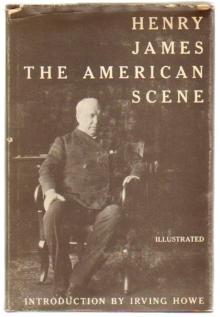 The American
The American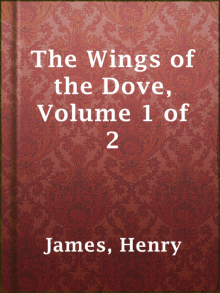 The Wings of the Dove, Volume 1 of 2
The Wings of the Dove, Volume 1 of 2 Frost at Midnight
Frost at Midnight Morning Frost
Morning Frost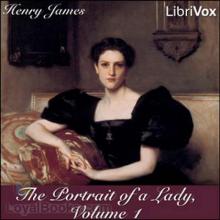 The Portrait of a Lady — Volume 1
The Portrait of a Lady — Volume 1 Fatal Frost
Fatal Frost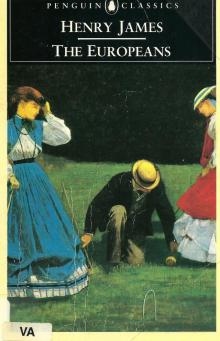 The Europeans
The Europeans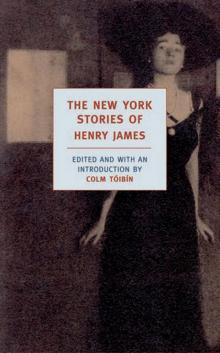 The New York Stories of Henry James
The New York Stories of Henry James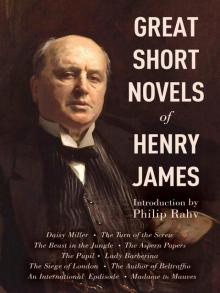 Great Short Novels of Henry James
Great Short Novels of Henry James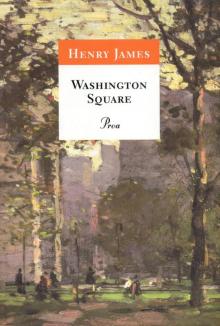 Washington Square
Washington Square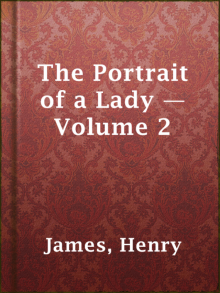 The Portrait of a Lady — Volume 2
The Portrait of a Lady — Volume 2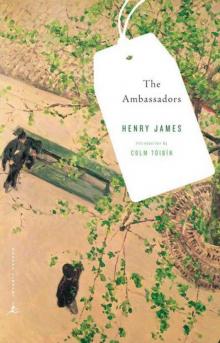 The Ambassadors
The Ambassadors The Wings of the Dove
The Wings of the Dove The Princess Casamassima (Classics)
The Princess Casamassima (Classics) The Coxon Fund
The Coxon Fund First Frost
First Frost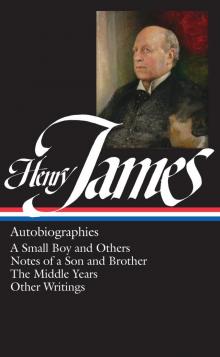 Henry James
Henry James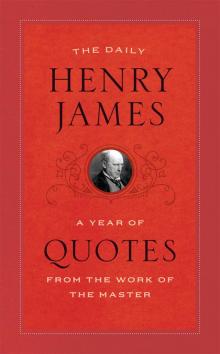 The Daily Henry James
The Daily Henry James Travels With Henry James
Travels With Henry James The Reverberator: A Novel
The Reverberator: A Novel What Maisie Knew (Henry James Collection)
What Maisie Knew (Henry James Collection)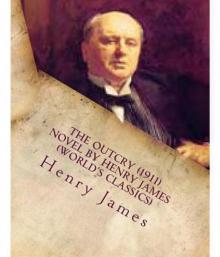 The Outcry
The Outcry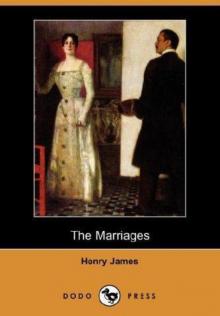 The Marriages
The Marriages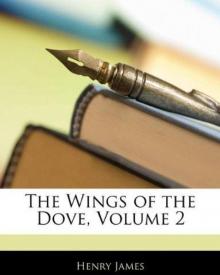 The Wings of the Dove, Volume 2
The Wings of the Dove, Volume 2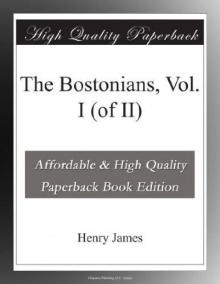 The Bostonians, Vol. I
The Bostonians, Vol. I The Outcry: -1911
The Outcry: -1911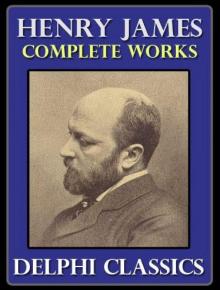 The Complete Works of Henry James
The Complete Works of Henry James Letters from the Palazzo Barbaro
Letters from the Palazzo Barbaro The Pupil
The Pupil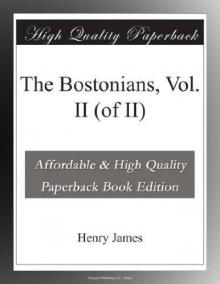 The Bostonians, Vol. II
The Bostonians, Vol. II Pandora
Pandora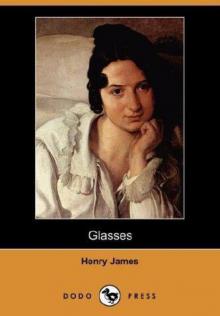 Glasses
Glasses The Princess Casamassima
The Princess Casamassima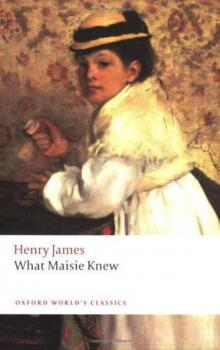 What Maisie Knew
What Maisie Knew The Reverberator
The Reverberator The Golden Bowl - Complete
The Golden Bowl - Complete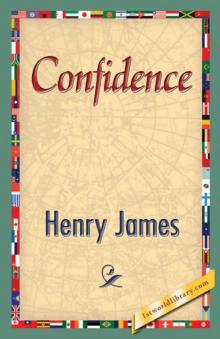 Confidence
Confidence Wings of the Dove (Barnes & Noble Classics Series)
Wings of the Dove (Barnes & Noble Classics Series)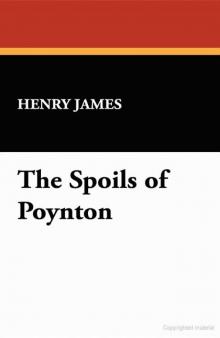 The Spoils of Poynton
The Spoils of Poynton